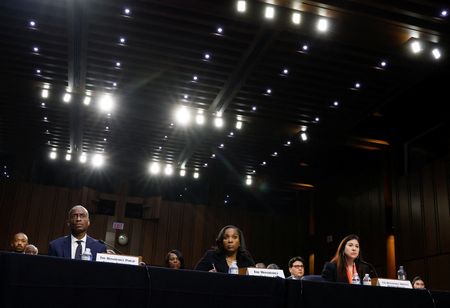 1
1 1
1
By Michael S. Derby
(Reuters) – Two Federal Reserve officials and a labor economist who aspires to join their ranks told U.S. senators on Wednesday that they will set policy based on data and the central bank’s official mandates, pushing back against some Republicans who suggested they might put personal politics first.
When setting policy at the central bank, “I think about the dual mandate first, and I think about the two legs of that dual mandate, and those are maximum employment and stable prices,” Fed Governor Lisa Cook said in the hearing of the Senate Banking Committee that was vetting her for a new term at the Fed.
Since joining the Fed last year, Cook said she’s worked with her colleagues to combat high inflation and if she is confirmed for more time at the Fed, Cook said that’s how she will continue to work.
Cook attended the hearing with Philip Jefferson, a Fed governor nominated to become vice chair, and Adriana Kugler, the U.S. executive director to the World Bank who has been nominated to fill a governor slot. She was responding to a question from J.D. Vance, a Republican senator for Ohio, who pressed her over her past views about diversity problems and their potential ability to exacerbate economic and financial troubles.
Over the last few years, the Fed has faced considerable pressure to diversify the ranks of its leadership from largely white males who have dominated the institution since its founding. The Fed has itself embraced this shift, believing that leaders from different backgrounds promote more effective policy-making.
Kugler is prospectively the first-ever Latina to serve on the Fed in its just over a century long history. Cook and Jefferson are black.
At the hearing’s start, Tim Scott, a South Carolina Republican and ranking member of the Senate Banking Committee, said two of the three nominees “seem more interested in having government serve their personal ideologies and their political priorities.” He flagged interest into environmental problems and racial inequality as a concern and added he wants Fed nominees “who want to serve the country and not have their positions be leveraged for their ability to weave into our overall philosophy their ideologies.”
Kugler also defended the primacy of the Fed’s mandate, and did so in personal terms.
“I spent my childhood in Colombia, where in the late 1970s and early 80s inflation was very high, hovering about 25%. This is something that you saw and felt in everyday life,” and it reinforced the importance of keeping price pressures low, she said.
The three nominees did not offer any guidance about what they think the Fed should do with monetary policy beyond affirming the importance of bringing inflation back to the 2% target. The Fed has been raising rates aggressively to cool price pressures but skipped a hike at its most recent meeting to take stock of the cumulative impact of its past tightenings.
In their testimony, the nominees said they agreed that bank regulations should be tailored to the risk levels and complexity of a given financial firm. They also affirmed the importance of a banking system that has both small and large banks and said financial sector concentration is not desirable and that the Fed should carefully weigh bank merger applications.
(Reporting by Michael S. Derby; Editing by Andrea Ricci)